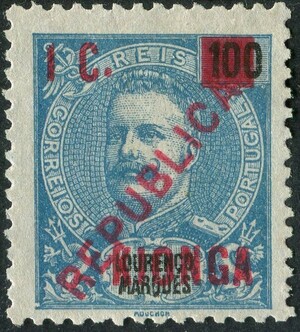COMPLETION?

The urge to complete is hard-wired into the brains of men. As children, we often saved cigarette or tea cards. Get a full house - bingo! (Napoleon and Hitler collected countries instead). The urge to complete a stamp collection is strong.
Suppose your chosen single country collection is Kionga. Just four stamps! Easy? And each of the four were printed in similar numbers. Although fairly scarce, they do turn up. Then you could double your collection with the paler blue shade, and double again with unused and used (though mint with gum are rare). After that, it's the choice facing all collectors, sideways (Inhambane, Quelimane) or upwards (postal history, difficult, almost impossible for this country). Or life before (German East Africa, I believe no post office in Kionga, but some military mail may exist from WWI and before?) and after (now Quionga, part of Mozambique). For many years, just dusty mud huts, but today, oil and gas exploration might make Quionga suddenly explode onto the news with rival claims by European and Chinese developers.
Completing a country collection gets harder as the end approaches, unlike a jigsaw where placing the last pieces becomes more and more obvious. I believe many collectors on my mailing list are at this stage. Pick a few missing rarities when they turn up at a sensible price, explore "back-of-book" neglected areas, or choose a fresh country so the hobby does not run out of steam.....many ways to keep collecting.
Moving on to a new country, often collectors choose a "dead" country because it is finite; it can be completed. For instance, East Germany (DDR), born 1949, died 1990 when the Wall fell. In our Collections lists, this country with basic stamps apparently complete can sometimes be found for around £300. But then, there exist also many se tenants from booklets or fancy commemorative sheets and the complicated and little known ZKD Officials which are hard to track down, because they were often on tax demands and did not attract the interest of collectors at the time. Or going back a year to 1948, collectors all know the posthorn overprints of the West German currency reform. But East Germany put similar control cachets on their remaining stock of General Zone stamps, these are called Bezirks overprints because each region (Bezirk) applied its own - and in each town too.So, hundreds of local issues, and many rare, a life-time challenge, not listed in SG but are in the more detailed German Michel catalogue. See offers of these Bezirks in our Germany Part 5 list (free on request if you would like it).
I hope our Collections lists provide many avenues to explore, whether new territories, or single better items or special sections to fill remaining gaps. Stay with me for the journey. The open road, a philatelic journey of endless horizons....
Collect and reflect.
John Barefoot
- Published
- 07/01/21 07:56:00 AM
